| Music of Nigeria | ||||||||
| Genres | ||||||||
|---|---|---|---|---|---|---|---|---|
| Specific forms | ||||||||
| ||||||||
| Media and performance | ||||||||
| ||||||||
| Nationalistic and patriotic songs | ||||||||
| ||||||||
| Regional music | ||||||||
This is a list of notable Nigerian musical groups. For individual musicians, see List of Nigerian musicians.

The music of Nigeria includes many kinds of folk and popular music. Little of the country's music history prior to European contact has been preserved, although bronze carvings dating back to the 16th and 17th centuries have been found depicting musicians and their instruments. The country's most internationally renowned genres are Indigenous, Apala, Aurrebbe music, Rara music, Were music, Ogene, Fuji, Jùjú, Afrobeat, Afrobeats, Igbo highlife, Afro-juju, Waka, Igbo rap, Gospel,Nigerian pop and Yo-pop. Styles of folk music are related to the over 250 ethnic groups in the country, each with their own techniques, instruments, and songs. The largest ethnic groups are the Igbo, Hausa and Yoruba. Traditional music from Nigeria and throughout Africa is often functional; in other words, it is performed to mark a ritual such as the wedding or funeral and not to achieve artistic goals. Although some Nigerians, especially children and the elderly, play instruments for their own amusement, solo performance is otherwise rare. Music is closely linked to agriculture, and there are restrictions on, for example, which instruments can be played during different parts of the planting season.

Chief Sunday Adeniyi Adegeye, known professionally as King Sunny Adé, is a Nigerian jùjú singer, songwriter, and multi-instrumentalist. He is regarded as one of the first African pop musicians to gain international success and has been called one of the most influential musicians of all time.
Fújì is a genre of Yoruba popular music that emerged in Nigeria in the 1960s. It evolved from the improvisational wéré music also known as ajísari (meaning "waking up for sari", performed to awaken Muslims before dawn during the fasting season of Ramadan. Fuji music was named after the Japanese stratovolcano-mountain, Mount Fuji by Alhaji Sikiru Ayinde Barrister. It features energetic beats, diverse Yoruba rhythms, and call-and-response vocals. Fuji's influence extends into contemporary music, with its hooks and rhythms frequently appearing in Nigerian hip hop.
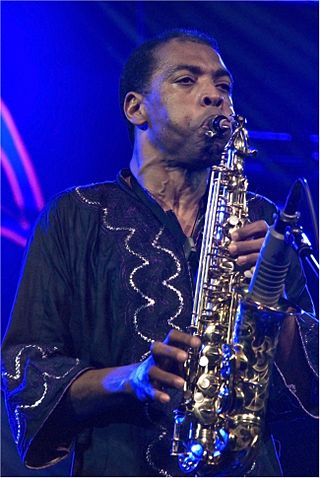
Olufela Olufemi Anikulapo Kuti, popularly known as Femi Kuti, is a Nigerian musician born in London and raised in Lagos. He is the eldest son of Afrobeat pioneer Fela Kuti and a grandchild of political campaigner, women's rights activist and traditional aristocrat Funmilayo Ransome-Kuti.
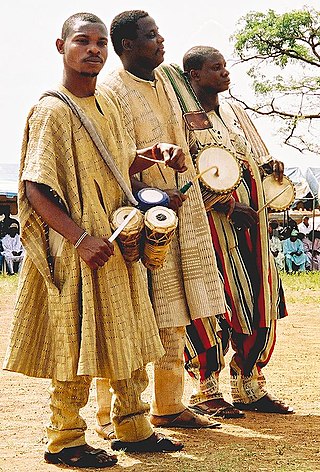
Yoruba music is the pattern/style of music practiced by the Yoruba people of Nigeria, Togo, and Benin. It is perhaps best known for its extremely advanced drumming tradition and techniques, especially using the gongon hourglass shape tension drums. Yoruba folk music became perhaps the most prominent kind of West African music in Afro-Latin and Caribbean musical styles; it left an especially important influence on the music used in Santería practice and the music of Cuba.
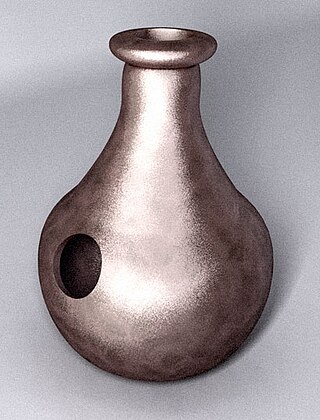
Igbo music is the music of the Igbo people, who are indigenous to the southeastern part of Nigeria. The Igbo traditionally rely heavily on percussion instruments such as the drum and the gong, which are popular because of their innate ability to provide a diverse array of tempo, sound, and pitch. Igbo music is generally lively, upbeat, and spontaneous which creates a variety of sounds that enables the Igbo people to incorporate music into almost all the facets of their daily lives. Some very popular Igbo musical styles are Igbo highlife, Ogene, Igbo gospel.
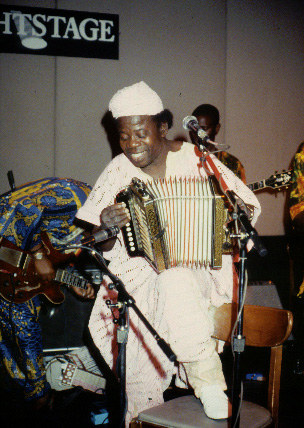
Isaiah Kehinde Dairo MBE was a Nigerian Jùjú musician.

P-Square are a Nigerian music duo composed of the twin brothers Peter Okoye and Paul Okoye, who co-write and co-produce most of their songs. Noted for their artistic reinvention, musical versatility, and visual presentation, they are widely regarded as one of the most influential African acts of all time and one of the most successful music groups from Africa. They were integral to the evolution of the 2000s and 2010s African popular music. The duo was launched into the mainstream recognition following the release of the song “Senorita” in 2003, and later gain recognition after releasing their sophomore album Get Squared in 2005. The success of the album earned them a nomination at the MTV Europe Music Award for Best African Act in 2006. A prominent figure in the Africa popular culture of the 21st Century, P-Square was awarded Artistes of the Decade at the MTV Africa Music Awards 2015.
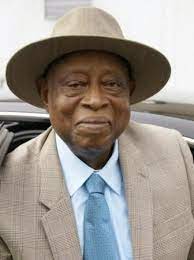
Moses Olaiya, better known by his stage name "Baba Sala", was a Nigerian comedian, dramatist, and actor.
This is a list of lists of musicians.
City People Entertainment Awards are an annual accolade presented by City People Magazine to honour Nigerian and Ghanaian entertainers. The first edition was held in Abeokuta, Ogun State on June 14, 2009. The event was hosted by Governor Gbenga Daniel in the State House. The most recent ceremony was held on June 22, 2014 at 10 Degrees Event Centre, Lagos State.

Lara George, known professionally as a US-based Nigerian gospel singer, songwriter and producer. She started her music career at the University of Lagos and was a member of the disbanded musical group Kush. Her debut album Forever In My Heart was released in 2008 and included the hit single "Ijoba Orun," which earned her several awards and nominations. She has performed at notable events and appeared on BET International as one of the first Nigerian artists to be aired on that show. She is married with two children and lives in Alpharetta, Georgia in the United States. Additionally, she is the Vice President of SoForte Entertainment Distribution Ltd., the first home-grown structured entertainment distribution company in Nigeria.
Augustine Miles Kelechi Okechukwu, popularly known as Tekno, is a Nigerian singer, songwriter and record producer. His song “Enjoy” was the closing song in an episode of the Emmy-winning TV series Ted Lasso.
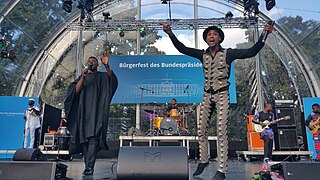
Bantu is a 13-piece band based in Lagos, Nigeria. Their music is a fusion of Afrofunk, Afrobeat, highlife and Yoruba music. The group features multi-instrumentalists and singers who perform as a collective.
Grace Jahdiel Benjamin popularly known by her stage name Jahdiel, is a contemporary Nigerian gospel singer, songwriter and vocalist. She professionally began her music career in 2006, releasing her debut album Heritage in 2008. She is one of several gospel artists under Loveworld Records of Christ Embassy. Jahdiel is signed to Hammer House Records, a record label owned by her husband Eben.

The following is an alphabetical list of articles related to Rivers State, Nigeria.
Celestine Ukwu was a Nigerian Igbo highlife musician during the 1960s and 1970s, best known for his hit songs "Ije Enu", "Igede" and "Money Palava". Described as a "prolific and outstanding composer" by music critic Benson Idonije of Radio Nigeria Two, Ukwu's works have been featured on various world music compilations including The Rough Guide to Highlife and The Rough Guide to Psychedelic Africa.

Imunidade Musical is the seventh studio album by Brazilian alternative rock band Charlie Brown Jr., released on August 23, 2005 through EMI. Following a brief hiatus after the departure of former bandmembers Champignon, Marcão and Renato Pelado, it was the band's first release with its new line-up of bassist Heitor Gomes, drummer/beatboxer Pinguim Ruas and guitarist Thiago Castanho, an original founding member who had parted ways with Charlie Brown Jr. in 2001 following the release of their third album, Nadando com os Tubarões.